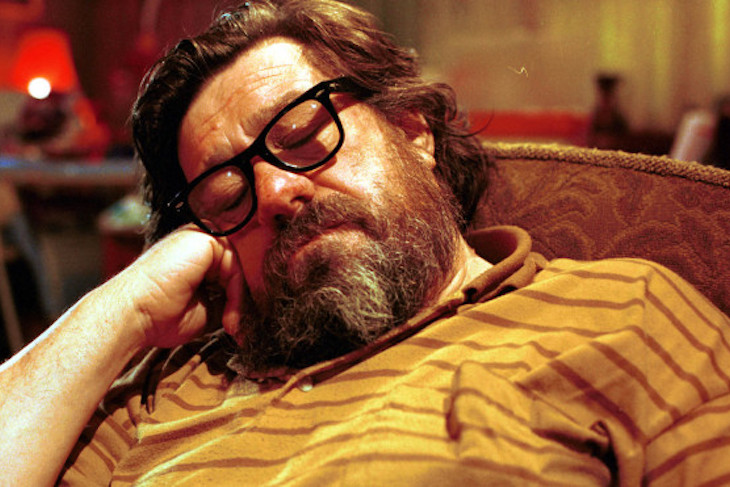Hard left, my arse. Sorry to be vulgar, but surely that’s how Jim Royle, couch-potato patriarch of that glorious sitcom The Royle Family, would have reacted to reports that the ‘hard left’ Momentum movement is planning a ‘massacre of the moderates’ in the parliamentary Labour party.
Don’t get me wrong. Having seized control of Labour’s National Executive Committee, Momentum is itching to purge the party’s benches of MPs who are insufficiently obsequious to Jeremy Corbyn. But calling this fragile political sect ‘hard’ left is silly. ‘Far’ left, perhaps — but let’s not confuse Momentum activists with the powerful Marxist bruisers of 40 years ago.
Momentum is more like a cult specialising in political theatre, or what I call the politics of dopamine. It’s not about ideology; it’s about drama and feeling. Its admirers and most prominent voices include a suspicious number of actors. There’s Paul Mason, for example, who rose to fame playing a ‘politically impartial’ BBC economics editor on Newsnight. Also Ricky Tomlinson, who put in an altogether more convincing performance as Jim Royle.
Jim was presumably Old rather than New Labour, judging by his references to ‘sausage jockeys’, though he was too busy farting in front of afternoon game shows to keep tabs on the NEC. Tomlinson, by contrast, is naturally given to ideological excess, having started in the National Front and ended in the Socialist Labour Party. He backed Corbyn in 2015, in a letter also signed by Brian Eno and Jeremy Hardy. He’s a generous soul — how many other actors have given a million quid of their own money to a children’s hospital? — but also a lifelong exhibitionist.
No wonder Momentum loves him and asks him to headline its events: like most of today’s sectarian movements, it prioritises entertainment over ideology. Its purges, if they happen, will be grippingly histrionic. They need to be. Otherwise the activists will yawn and drift away.
Keeping your audience amused is now the fundamental imperative in public life, not just on the left — look at Trump — and not only in politics. Even popes are in on the act. What about that mile-high wedding service conducted by Pope Francis as he flew from Chile? Presented as a lovely spontaneous surprise for the happy couple of flight attendants, it was immediately exposed as a meticulously prepared PR stunt.
What claptrap that postmodern ‘death of the narrative’ has turned out to be — even more misleading than ‘the end of history’. Public figures are expected to tell stories all the time; they just don’t add up to anything. Francis Fukuyama was embarrassingly wrong to suggest in 1989 that we had reached ‘the universalisation of western liberal democracy’. But his talk of a post-ideological world isn’t so easily dismissed. If you can discern an overarching shape to history, then either you’re some sort of religious fanatic or that’s some strong stuff you’re smoking.
But aren’t Jeremy Corbyn and John McDonnell doctrinaire Marxists? That requires them to believe in the coming revolution and dictatorship of the proletariat, followed by the withering away of the state as a truly classless era dawns. Crazy, perhaps, but don’t you admire their sincerity?
Oh please. Corbyn isn’t quite naive enough to subscribe to this apocalyptic fantasy (and, in any case, would need a couple more IQ points to understand it). The shadow chancellor, who originally planned to be a Catholic priest, is temperamentally more dogmatic. He thinks he’s hard. He isn’t: he’s a former local government official with a taste for revolutionary jargon, like hundreds of others, only nastier. He’s a Marxist tribute act, performing for a fan club — Momentum — who are too young and stupid to recognise him as the equivalent of a geriatric Elvis impersonator.
The 21st century is full of tribute acts, of showmen passing off old tricks as original thinking. They get away with it because there’s no appetite for sustained political argument. What we want is a dopamine hit. In this respect most of us are no different from the bored busybodies of Momentum. We’re underemployed and over–opinionated, spoiled for choice by the internet. We flick channels as restlessly as Jim Royle, in search of a burst of theatrical outrage that confirms our prejudices.
The media are as compromised as consumers. Hence the delicious spectacle of Cathy Newman of Channel 4 News gasping for air as she was dragged out of her filter bubble by the libertarian psychologist Jordan Peterson, one of the few independent thinkers who flourishes on YouTube. Not coincidentally, he’s an authority on dopamine, the neurotransmitter that delivers short-term rewards to the brain.
It’s hard to think of an area of public life that hasn’t moulded itself around our ever-growing reliance on these rewards. It’s not a process that throws up fresh ideas. On the contrary, it has rescued ancient ego-trippers from the end of the pier. Corbyn, Trump, Francis — until recently, the thought of any of these men wielding executive power would have been dismissed as surreal fantasy.
The politics of dopamine aren’t new. They are, more or less, what the great German social theorist Max Weber meant when he coined the term ‘charismatic authority’ just before the first world war.
The word charisma, used by St Paul to describe miraculous spiritual gifts, was familiar only to Bible scholars until Weber revived it. His charismatic authority is neither good nor bad: he used the term to describe the unstable power of warriors, saints, pirates, politicians and Wall Street con-artists who manage to persuade their audiences that they can work wonders. When their magic fades, their audiences dissipate. So does their authority.
Weber thought bureaucracy and science would banish charismatics and their cult followings to the sidelines. How wrong he was. But he also thought charisma had the potential to be the greatest creative force in history.
Maybe he was right about that. There is nothing much we can do about our cravings for short-term stimulation, short of dismantling digital technology. Our best hope is that we can discover charismatic leaders who aren’t fanatics or shysters, but bursting with fresh ideas. No offence, but I don’t think Theresa May quite fits the bill.
Got something to add? Join the discussion and comment below.
Get 10 issues for just $10
Subscribe to The Spectator Australia today for the next 10 magazine issues, plus full online access, for just $10.
You might disagree with half of it, but you’ll enjoy reading all of it. Try your first month for free, then just $2 a week for the remainder of your first year.














Comments
Don't miss out
Join the conversation with other Spectator Australia readers. Subscribe to leave a comment.
SUBSCRIBEAlready a subscriber? Log in